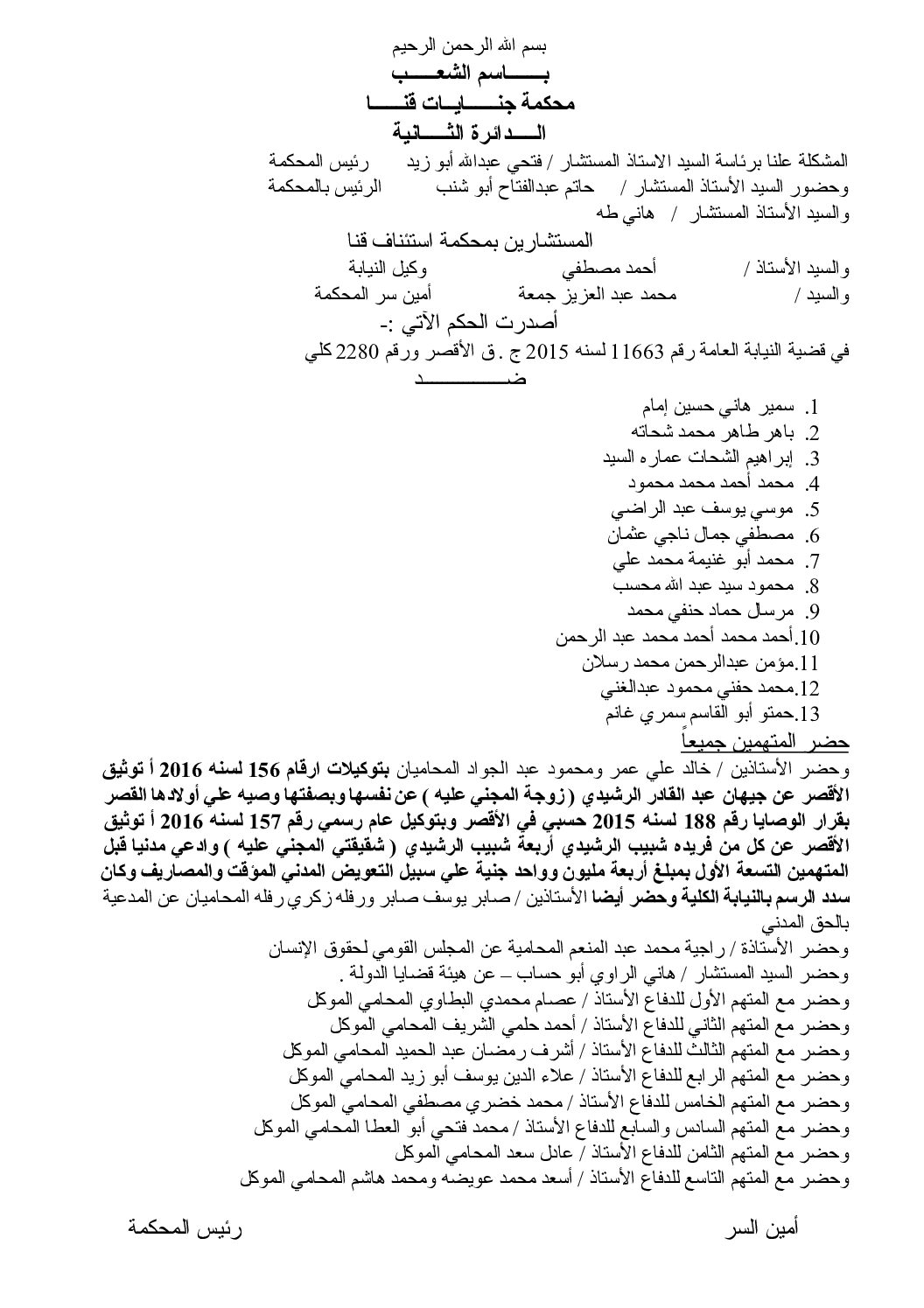Protest Movement – September 2012, 2nd Half
315 Incidents: The Workers’ Sky is Raining Protests
A heated start to the new academic year played an important role in the increase in the activity of the protest movement where the teachers, university staff, and students carried out strikes, sit-ins, and demonstrations to demand their rights, which focused on improving their financial and employment circumstances at a time when voices started to call against increase in prices, and shortages in basic good and services, and calling for an end to thuggery and the state of lawlessness.
The Egyptian Center for Economic and Social Rights’ report noted 315 protests during the second half of the month of September 2012. In a detailed look at these protests we will find that the largest share was in the governmental sector where they carried out 153 incidents of protest; citizens carried out 92; as for students they came in at third place with 26 protest incidents; entrepreneurs 19; the private sector witnessed 15 incidents; while the public sector witnessed 10 incidents only.
The forms of protests varied: 93 rallies; 55 demonstrations; 55 strikes; 34 sit-ins; 21 hunger strikes; 17 incidents of banditry; 13 marches; 11 incidents of public gatherings; five incidents of storming of governmental bodies; five incidents where university and school gates were closed; four incidents of students’ strikes; and two incidents of protesting by taking off clothing.
As for the protesting groups: citizens/ the general public were at the forefront ‘with 92 incidents of protests; teachers and education administrators 41; government workers 31; factory and company workers 28; faculty and staff at universities 26; students 26; the medical sector “doctors, nurses, and technicians” 22; drivers 14; police officers and non-commissioned police officers: seven incidents; engineers and journalists: four incidents of protests each; lawyers, customs agents, athletes, and street vendors: two incidents; and one incident each by: veterinarians, contractors, mosque employees, emergency aid workers/ paramedics, airport loading workers, bakery owners, sailors, tourist guides, cafeteria owners, warehouse owners, store owners, and fish farm tenants.
As for the number of protests, Cairo occupied the first place: 55 incidents; Dakahlaya 26; Alexandria and Minya 25; Sharkaya 20; Gharbaya 19; Assiut 18; Suez 15; Fayoum and Qalubaya 12; Ismilia 11; Kafr El-Sheikh 10; Port Said 8; Al-Behayra and Damietta 7; Bani Suweif and North Sinai 6; Red Sea and the New Valley 5; Luxor and Aswan 4; Giza and Marsa Matrouh 3; Qena and Sohag 2; Menofaya and South Sinai one incident each.
Improving living conditions, increasing wages, and paying allowances and benefits were at the forefront with 91 incidents of protest; 28 incidents were to protest against the state of lawlessness and thuggery; 19 incidents to demand employment and permanent employee status; 11 incidents because of shortages of natural gas cylinders; 10 cases demanding the dismissal of officials; nine incidents because of decisions of arbitrary transfer; five incidents to demand housing units; five incidents because of the deterioration of services in some villages; five other incidents because of/ against corruption; five incidents to demand employment; four incidents because of increased transportation fares; four to demand the establishment of a school; four to protest against fuel shortages; four incidents to protest against abuse/ ill-treatment/mistreatment; four incidents to protest against transferring students to different schools; three incidents because of unfair dismissal; three incidents because of increase in rents; three incidents calling for the release of detainees; three incidents demanding the attaching of the Transportation Authority to the Ministry of Transportation instead of the Cairo governorate; two incidents because of the deterioration of medical services; two cases demanding debt exemption; two incidents because of sewage and sanitation; two to demand the paving of roads; two incidents to protest mismanagement; two to protest the lack of student housing at universities; two to demand that prisoners be pardoned; two protests by farmers demanding the return of their lands; two demanding the codifying of the state of affairs; two incidents demanding that universities lower their acceptance grades; two incidents protesting against the lack of teachers; two incidents demanding the hand over of land; two demanding the installation of an electricity transformer; two incidents to protest the high prices
of textbooks; two cases because of the Nile University crisis; two to protest the laying off of workers; two cases to demand health insurance; two cases to demand the cancellation of mandate decisions; two cases demanding factory operation; and one case because of each of torture, inflation, negligence, the imposition of fines, road accidents, water pollution, the sale of a youth center, and land infringements.
Workers protested to: demand that factories operate, to change the work system, against the referral of their colleagues to prosecution on charges of incitement to strike, to demand that they be returned to their jobs, and against the use of force to break up sit-ins.
As for citizens, some of them protested poor living conditions, poor housing conditions, chaotic traffic, and some protested demanding the closure of factories near residential areas that are harmful to the environment.
Graduates protested to demand jobs and demand agricultural lands.
Drivers protested to demand higher passenger tariffs, and that routes be changed, they also protested against the imposition of arbitrary fines, and fuel shortages.
Doctors and nurses protested the state of lawlessness and thuggery that most hospitals are witnessing at the present time, to demand the payment of incentives and benefits, and to protest the decision to close a hospital.
Students protested against the cancellation of the open education system and the return of the affiliation system; to demand a solution to the Nile University crisis; to demand that acceptance grades into universities be lowered and that the results be announced, or be allowed to attend the faculty of engineering; the protested against the arrest of their colleagues; the high prices of text books, high tuition fees, and transferring students to schools far away from their place of residence.

